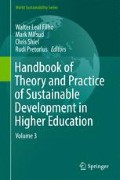Abstract
Sustainability champions are iconic men and women who have shaped the scholarly understanding of sustainability by considering broad, alternative, and visionary solutions to sustainability problems. For instance, sustainability champions such as Rachel Carson, Aldo Leopold, Wangari Maathai, Daniel Quinn, and Vandana Shiva have disciplinary expertise whose inspiration has radiated through the pillars of sustainability, crossing disciplines in natural and social sciences. The roles played by sustainability champions and their role in sustainability education have not been fully explored. This study aimed to identify sustainability champions within an academic unit focused on sustainability research, to provide context for their inspiration, and bring attention to the use of role models in sustainability graduate education. Using survey results from students, faculty, post-doctoral fellows, and staff within the School of Environment and Sustainability at the University of Saskatchewan, we discovered that the sustainability champions they selected embodied diverse backgrounds and expertise: writers, artists, professors, activists, and politicians. Participants were mostly inspired by individuals in the Professor category, representing 33.8 % of the 47 total survey responses. However, other categories such as Writer/Artist received moderate attention with 18.3 % and both Activists and Multiple (more than one category) with 15.5 %. Furthermore, surveyed faculty credited their sustainability champion for broadening their views and research, whereas students felt their champions opened them to new ideas. More than half of students, faculty, post-doctoral fellows, and staff surveyed indicated their sustainability champions had changed at some point during their academic career—possibly demonstrating that impression from a sustainability champion can inspire at any stage of career.
“Models are one of the most important pedagogical agents in the history of education”
Anton A. Bucher (1997, pp. 620).
Access this chapter
Tax calculation will be finalised at checkout
Purchases are for personal use only
References
Anderson, B., Cutright, M., & Anderson, S. (2013). Academic involvement in doctoral education: Predictive value of faculty mentorship and intellectual community on doctoral education outcomes. International Journal of Doctoral Studies, 8, 195–201.
Barth, M., & Michelsen, G. (2013). Learning for change: an educational contribution to sustainability science. Sustainability Science, 8, 103–119.
Braun, V., & Clarke, V. (2006). Using thematic analysis in psychology. Quality Research in Psychology, 3, 77–101.
Black, E. W. (2008). Wikipedia and academic peer review: Wikipedia as a recognised medium for scholarly publication? Online Information Review, 32, 73–88.
Bricheno, P., & Thornton, M. E. (2007). Role model hero or champion? Children’s views concerning role models. Educational Research, 1881, 1–22.
Bucher, A. A. (1997). The influence of models in forming moral identity. International Journal of Educational Research, 27, 619–627.
Cortese, A. D. (2003). The critical role of higher education in creating a sustainable future. Planning for Higher Education, 15–22.
Hunter, K. H., & Devine, K. (2016). Doctoral students’ emotional exhaustion and intentions to leave academia. International Journal of Doctoral Studies, 11, 35–61.
Leal, W. F., Shiel, C., & Do Paço, A. (2015). Integrative approaches to environmental sustainability at universities: an overview of challenges and priorities. Journal of Integrative Environmental Sciences, 12, 1–14.
Leal, W. F. (2011). About the role of universities and their contribution to sustainable development. Higher Education Policy, 24, 427–438.
Nielsen-Pincus, M., Morse, W. C., Force, J. E., & Wulfhorst, J. D. (2007). Bridges and barriers to developing and conducting interdisciplinary graduate-student team research. Ecology Society, 12, 1–14.
Pooley, S. P., Mendelsohn, J. A., & Milner-Gulland, E. J. (2014). Hunting down the chimera of multiple disciplinarity in conservation science. Conservation Biology, 28, 22–32.
Raivio, K. (2011). Sustainability as an educational agenda. Journal of Cleaner Production, 19, 1906–1907.
Rhoten, D., & Parker, A. (2004). Risks and rewards of an interdisciplinary research path. Science, 304, 1251–1252.
Rockström, J., Steffen, W., Noone, K., Persson, Å., Chapin, F. S., Lambin, E. F., et al. (2009). A safe operating space for humanity. Nature, 461(7263), 472–475.
Rose, D. (2004). The potential of role-model education. In The Encyclopedia of Informal Education. Last Accessed January 20, 2016 http://infed.org/mobi/the-potential-of-role-model-education/
Roy, E. D., Morzillo, A. T., Seijo, F., Reddy, S. M., Rhemtulla, J. M., Milder, J. C., et al. (2013). The elusive pursuit of interdisciplinarity at the human—environment interface. BioScience, 63(9), 745–753.
Ryan, M. M., Yeung, R. S., Bass, M., Kapil, M., Slater, S., & Creedon, K. (2012). Developing research capacity among graduate students in an interdisciplinary environment. Higher Education Research and Development, 31(4), 557–569.
Steelman, T. A., Nichols, E. G., James, A., Bradford, L., Ebersöhn, L., Scherman, V., et al. (2015). Practicing the science of sustainability: the challenges of transdisciplinarity in a developing world context. Sustainability Science, 10(4), 581–599.
Steffen, W., Crutzen, P. J., & McNeill, J. R. (2007). The Anthropocene: are humans now overwhelming the great forces of nature. Ambio, 36(8), 614–621.
Wiek, A., Withycombe, L., & Redman, C. L. (2011). Key competencies in sustainability: A reference framework for academic program development. Sustainability Science, 6(2), 203–218.
Zare, R. N., & Metzger, N. (1999). Interdisciplinary research: From beleif to reality. Science, 283(5402), 642–643.
Author information
Authors and Affiliations
Corresponding author
Editor information
Editors and Affiliations
Rights and permissions
Copyright information
© 2017 Springer International Publishing AG
About this chapter
Cite this chapter
Cavallaro, M.C., Boucher, M., Steelman, T.A. (2017). Sustainability Champions: Role Models in Sustainability Graduate Education. In: Leal Filho, W., Mifsud, M., Shiel, C., Pretorius, R. (eds) Handbook of Theory and Practice of Sustainable Development in Higher Education. World Sustainability Series. Springer, Cham. https://doi.org/10.1007/978-3-319-47895-1_20
Download citation
DOI: https://doi.org/10.1007/978-3-319-47895-1_20
Published:
Publisher Name: Springer, Cham
Print ISBN: 978-3-319-47894-4
Online ISBN: 978-3-319-47895-1
eBook Packages: Earth and Environmental ScienceEarth and Environmental Science (R0)

